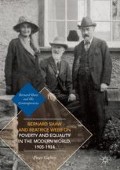Abstract
Towards the end of 1905, Bernard Shaw’s great play on urban poverty and the power of money, Major Barbara, opened at the Court Theatre, perhaps the high point of the New Drama, which created a whole new audience for theatre, the young Fabian audience, including many young women wanting economic independence. Beatrice Webb was appointed to the Poor Law Commission, set up by the outgoing Conservative Prime Minister, Arthur Balfour, which would lead in 1909 to her highly influential Minority Report on the Poor Law.
Access this chapter
Tax calculation will be finalised at checkout
Purchases are for personal use only
Author information
Authors and Affiliations
Rights and permissions
Copyright information
© 2017 The Author(s)
About this chapter
Cite this chapter
Gahan, P. (2017). 1905: Poverty, Salvation and the Poor Law Commission. Major Barbara . In: Bernard Shaw and Beatrice Webb on Poverty and Equality in the Modern World, 1905–1914. Bernard Shaw and His Contemporaries. Palgrave Macmillan, Cham. https://doi.org/10.1007/978-3-319-48442-6_2
Download citation
DOI: https://doi.org/10.1007/978-3-319-48442-6_2
Published:
Publisher Name: Palgrave Macmillan, Cham
Print ISBN: 978-3-319-48441-9
Online ISBN: 978-3-319-48442-6
eBook Packages: Literature, Cultural and Media StudiesLiterature, Cultural and Media Studies (R0)

